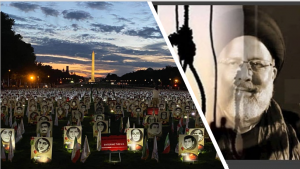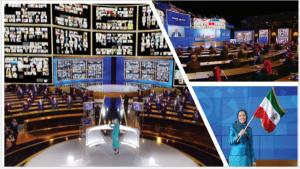Iranian Opposition TV Interview with Former UK Defense Minister, Dr. Liam Fox
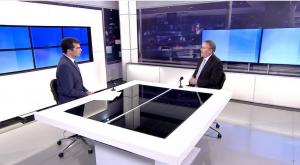
Former British Defense Minister and MP Dr. Liam Fox addressed the Iranian opposition group (MEK) at Ashraf 3 in Albania on March 30. In an interview with Iranian opposition TV, Simay-e Azadi , Dr. Fox reiterated his support of the organized Resistance movement.
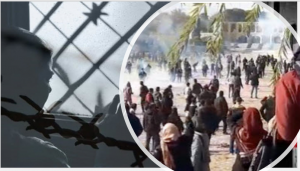
Dr. Fox praised the bravery of Iranian women in the fight for freedom. He supports the Iranian people’s struggle for democracy, freedom, and the rule of law. He emphasized that only the abandonment of the mullahs allow Iranians to have their own freedom.
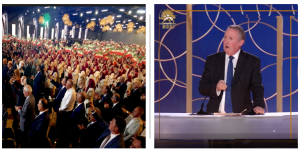
Dr. Liam Fox, "is the human soul that no amount of barbarity can suppress it. And that for me, was the number one lesson and again the dignity and commitment of people to that freedom amongst those that I met at Ashraf 3 was very humbling".
Dr.Fox, "The dignity, courage, and commitment of those who endured all that suffering and whose spirit is continued today in the Iranian resistance movement".
He also urged the UK and Europe to increase pressure on the ruling theocracy, while supporting the ten-point plan of the National Council of Resistance of Iran - NCRI, president-elect Mrs. Maryam Rajvi for the future of Iran.
In his remarks addressing the People’s Mojahedin organization of Iran(PMOI/MEK) members on March 3, Dr. Fox condemned the Iranian regime’s disregard for human dignity and safety, complicity in human rights abuses and crimes against humanity, and the use of the Velayat-e faqih governing ideology as a tool for oppression.
He praised the bravery of Iranian women in the fight for freedom and urged Western countries to support the Iranian people’s struggle for democracy, freedom, and the rule of law. Dr. Fox emphasized that only the abandonment of the Velayat-e faqih could allow Iranians to have the freedom of expression and self-determination they require.
Below is the full text of Simay-e Azadi’s interview with Dr. Fox, revised and edited for clarity.
We’re very glad to have you with us. First of all, I would like to ask you about your recent trip to actually have three and visit the museum in Ashraf 3 I think it’s very easy for people to see it as just a series of dreadful atrocities and abuses of human rights, but what struck me the most from my visit was not the cruelty and the wickedness of the people who were carrying out torture and imprisonment, and execution.
But the dignity and courage and commitment of those who endured all that suffering and whose spirit is continued today in the Iranian resistance movement.
In Ashraf 3, you had time to talk to the Ashrafis. What was it like an experience to talk with them?
Well, I talked to people who had actually experienced it. The suffering and the degradation imposed by the regime on those who are unfortunate enough to be the victims in their prisons.
It was very moving to hear people talk about what it was like to see friends executed and tortured themselves and was this incredible sense of dignity and what struck me was the desire for freedom.
As I said, while I was there is so deeply ingrained in the human soul that no amount of barbarity can suppress it. And that for me, was the number one lesson and again the dignity and commitment of people to that freedom amongst those that I met at Ashraf 3 was very humbling.
You also mentioned the role of women in Iran in the struggle against the Iranian regime. How do you see this role, and what should do the world to support the women in Iran and their struggle against the Iranian regime?
I think a lot of people don’t really understand how much the regime seems to hate women. Some of the worst stories I heard about torture, for example, were those that were aimed at women in Iranian prisons. And there are very few if any, other places that I can think of around the world that specifically seek out women to be the victims of the violence in the way that the current regime does.
It’s a deeply misogynistic regime. I found it difficult to try to get my head around why that should be. But the courage of Iranian women in taking on the beast that is the Khamenei many regimes is quite remarkable and I would like to see more support around the world, given not just by women’s groups but by all human rights groups, to the women especially, who have been putting so much at risk to fight for the rights not just for women, but for all their fellow citizens.
Another topic is the regime’s nuclear program. Some still hope to revive the Joint Comprehensive Plan of Action (JCPOA) or you have expressed your total opposition to the JCOPA. What do you think should be an alternative policy to deal with the Iranian regime and the problems like the ballistic missile, terrorism, and the nuclear issue?
You need to have a much more realistic view, I think, in dealing with the nuclear issue alone is not sufficient and I remember that the JCPOA didn’t ultimately seek to stop Iran from having a nuclear weapon merely to delay it for a number of years, which was a change from the initial view, which I think is it was a mistake.
But if you’re going to do that, you also need to make sure that they cannot deliver a weapon to the ballistic missile program needs to be taken into account. It is, of course, in breach of UN resolutions at the present time. The wish to destabilize their neighbors’ is deeply corrosive, that needs to be tackled.
Their exports of terrorism, including to Europe, need to be dealt with and the way that they will use proxy terror to destabilize other countries, Lebanon, Syria, and so on, needs to be taken into account. The focus is too narrow of the agreement, and even when it does deal with the nuclear issue doesn’t go far enough.
The other issue is the human rights issue and the crimes the regime has committed against the Iranian people. One part of those crimes is what you mentioned in the museum from Ashcraft, like the massacre in 1988. Another part is what is going on right now in Iran after the uprising 7-8 months ago.
What do you think the international community should do, can do, to hold the Iranian regime accountable for its human rights record?
This is a regime that has no respect whatsoever for the human dignity of human life. That has been true since the beginning of the regime since Khomeini took over with the massacres in 1988. It continues to the present day, the policy hasn’t changed. Perhaps it becomes more extreme or more widely used at any one time, but the inherent viciousness of the regime hasn’t altered.
And I think that needs to be taken into account when we think about how we deal with Iran and also when you’re talking about limitations.
You also spoke about the need for Western policymakers. You said that they need to stand up to the Iranian regime’s abhorrent practices and make it clear that we won’t be blackmailed by such a regime with no moral authority. What specific actions do you think should be taken in that regard?
We should continue with the sanctions that we have at the present time, if necessary tightening them, I would like to see the Islamic Revolutionary Guards Corps (IRGC) regarded as a terrorist organization.
I would like to see it prescribed in the UK. I’ve also, in the British Parliament been talking about why we should ban Iran Air from using our airports.
We need to think of as many ways as possible of making clear our opposition towards it is that they’re doing, but we also have a duty to tell people what is
happening and use all the means at our disposal to ensure that as wide an international public as possible, recognize what is being done in Iran today.
Do you think, is there any legal issue that prevents your government to list the IRGC as a terrorist group?
I think it’s a political argument. I have argued on will continue to argue that they should be regarded as a banned organization. The IRGC is the means by which A hugely distorted, dishonest, and vicious theocratic government imposes its will on the Iranian people.
They are the vehicle by which the Mullah oppress the people of Iran, and they need to be held to account for their behavior.
You’ve also expressed your support for the 10-point plan of Mrs. Maryam Rajavi. What do you see in that plan? What do you think about Mrs. Rajavi’s role in this resistance against the Iranian regime .
But first of all, I think she’s a very remarkable woman brave she has gone so much in terms of the cost to her and her family, in maintaining her very principled approach to the wicked behavior of the regime.
And I think that what she offers is a practical way forward. Very often, you get a lot of rhetoric from would-be leaders. What she has set out is a road map that makes sense, I think and I wish I wish her Well and you know if she wasn’t such a strong leader, the regime wouldn’t be putting so much effort into trying to undermine her and her organization.
Now you referred to the people of Iran at the end of her interview. If you like, you could speak to them directly, those who will watch this interview Inside Iran.
You need to know that you’re not alone. But the world is watching. The world regards the regime as one of the world’s most evil, corrupt, and vicious regimes.
The world wants you, the people of Iran, to determine your own future, to enjoy the democracy, human rights, and freedom that we take for granted. And to be able to exist under a rule of law that is impartial, which is not theocratic. And which is modern.
All of these things you deserve. And ultimately, we will do what we can to ensure that you have the future that you desire. You can and you must.
Shahin Gobadi
NCRI
+33 6 61 65 32 31
email us here
MP Liam Fox interview with Simaye Azadi (Iran NTV)
Legal Disclaimer:
EIN Presswire provides this news content "as is" without warranty of any kind. We do not accept any responsibility or liability for the accuracy, content, images, videos, licenses, completeness, legality, or reliability of the information contained in this article. If you have any complaints or copyright issues related to this article, kindly contact the author above.

